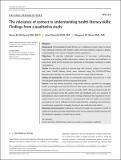The relevance of context in understanding health literacy skills: findings from a qualitative study
Date
2017-04-12Author
McKenna, Verna B.
Sixsmith, Jane
Barry, Margaret M.
Metadata
Show full item recordUsage
This item's downloads: 259 (view details)
Cited 14 times in Scopus (view citations)
Recommended Citation
McKenna, Verna B., Sixsmith, Jane, & Barry, Margaret M. (2017). The relevance of context in understanding health literacy skills: Findings from a qualitative study. Health Expectations, 20(5), 1049-1060. doi: doi:10.1111/hex.12547
Published Version
Abstract
BackgroundConceptualizing health literacy as a relational concept, which involves how individuals interact with complex health and social systems, requires a greater understanding of the context of people's health experiences.ObjectivesTo describe individuals' experiences of accessing, understanding, appraising and applying health information; explore the barriers and facilitators to using these skills; and to describe the experience of information exchange in health consultations.DesignA longitudinal qualitative methodology with thematic analysis of interviews was used. Health literacy levels were assessed using the HLS-EU-47-Item Questionnaire. Findings are presented from the first round of data collection.Setting and participantsTwenty-six participants purposefully selected from a CVD risk reduction programme at three separate time points.ResultsFour key themes identified: using health literacy capacities for managing health; psychological and structural factors that impact on these capacities; and the relationship quality with the health-care provider (HCP). Although limited health literacy was prevalent across the sample (65%), all individuals were very proactive in attempting to utilize health literacy skills. Findings emphasize the importance of contextual factors such as the quality of communication with the health-care provider, perceptions of control, attitudes to family medical history, navigating structural barriers and being supported in managing treatment and medication side-effects.Discussion and ConclusionFindings are relevant for health-care providers in order to enhance the patient-provider relationship and to ensure optimum health outcomes for all individuals regardless of health literacy levels.


